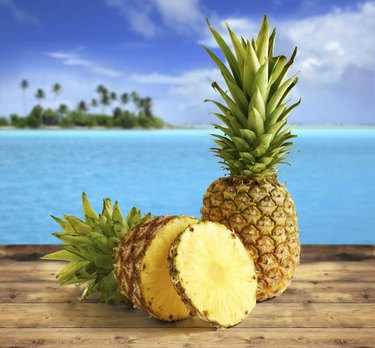
Organic food is growing in popularity, but it is more costly and harder to find than conventionally produced food. Adding a small amount of organic produce -- particularly as a substitute for conventionally-grown products with higher levels of pesticide residue -- is a good idea. But a well-rounded diet of non-organic fruits, vegetables and low-fat sources of protein is an economical and healthy choice for most consumers.
Cost Savings
Video of the Day
Non-organic food items are usually cheaper than the organic counterpart because farming and growing methods yield more food per acre. There is minimal loss due to insect damage and the shelf life is often longer. Most of the food available in supermarkets is not certified organic and consumers are familiar with these brands. Because non-organic brands are reliably consistent in taste, texture and quality, consumers know what to expect from their purchases and there may be less waste.
Video of the Day
Buying Local
Buy local food. Food produced close to home saves gas and supports small business. Farm markets and community-supported agricultural co-ops are a good resource for consumers. The food available is fresh and varied. Often, the meat and produce is raised organically but lacks costly organic certification. Because it is not stored for long periods of time, produce grown for the local market may not be treated with high levels of pesticides and fungicides.
Farming Practices
Organic farming techniques may be less damaging to the environment, but conventional farming offers more yield per acre, reducing the amount of land needed to grow food. Pesticides use on farms are regulated by the Environmental Protection Agency. As concern over pesticide use has increased, the EPA says its focus has "begun to shift towards promoting systems of pest management that better protect health and the environment while enhancing the quality of our lives."
Nutrition and Food Safety
Some produce has less pesticide residue than others. The Environmental Working Group publishes a list of fruits and vegetable with the highest and lowest amounts of residue. They recommend that cost-conscious consumers purchase non-organic items from the "Clean 15" list which includes fruit and vegetables with thick skins, such as pineapple, avocado, and grapefruit. Buying organic food may not always be the safer choice; the U.S. Department of Agriculture has fined a Chinese company for producing fake organic certification labels and a deadly outbreak of E. coli has been attributed to organic bean sprouts.
- "USA Today"; Is Organic Always the Best Pick When It Comes To Buying Food? Elizabeth Weise; December 2010
- U.S. Department of Agriculture: Agriculture; USDA Issues Public Notice of Fraudulent National Organic Program Certificate; February 2011
- U.S. Environmental Protection Agency: The EPA and Food Security
- Environmental Working Group: The Full List: 53 Fruits and Veggies
- Reuters.com; Analysis: E.coli Outbreak Poses Questions for Organic Farming; Kate Kelland; June 2011
- The Daily Green: Buy the Clean 15
- The Daily Green: The New Dirty Dozen: 12 Foods to Eat Organic